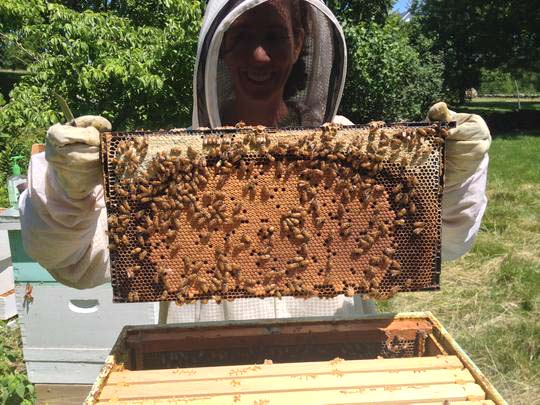For beekeepers, early spring is a reckoning day of sorts. This is the time when apiarists open the hives and check to see how the bees have fared over the winter.
In college, Kathy Halamka, artist, beekeeper, and cofounder of Unity Farm Sanctuary in Sherborn, rented lodging from a beekeeper in California. This was the 1980’s, before the onslaught of Varroa destructor mites which destroyed the feral bee colonies, and early in the proliferation of toxic pesticides in the bees’ food supply. “Beekeeping in the 80’s was almost as simple as walking to a hive if one was collecting honey. Now in 2019, you must be actively working to monitor, test and treat hives.” The Varroa mites weaken bees by sucking their blood, and can transmit disease. “Added to the mix is the pressure placed on bees by the pesticide/herbicide/fungicide load in the environment. Bees fly long distances, and we beekeepers cannot directly control spraying in their fly zone.”
Halamka cofounded Unity Farm Sanctuary to provide a safe, loving home for farm animals, and by engaging with the public through educational opportunities and tours, to promote a culture of kindess and connection. Residents of the farm include alpaca, horses, ponies, miniature horses, cows, goats, pigs, poultry, and bees. “I have 6 colonies at the Sanctuary, and they are hybrid or Northern raised Carniolan. My survival rate was approximately 75% this winter.”
Tony Lulek of Little Beehive Farm in Holliston cites fertilizers, herbicides, fungicides, and sprays for ticks and mosquitos as major hazards to pollinators. “Backyard pesticides are a $3 billion a year industry. Even an organic cedarwood oil tick spray kills all insects. It breaks down the exoskeleton of the bees and affects the larval stage.”
Neonic pesticides alter the bees’ neurological systems. According to the not-for-profit organization Friends of the Earth Action, a single corn kernal coated in a neoniconitoid pesticide can kill a bird.
Monsanto, the primary source in the U.S. for commercial seed and pesticides, was acquired by the German company Bayer in June 2018. Bayer is a corporate spinoff of I. G. Farben, which is known for its lethal experimentation on Jews in the Holoscaust. The company manufactured cans of Zyklon B gas used in Auschwitz’s gas chambers.
Glyphosate, a component of Monsanto’s weed killer Roundup, has been identified in a large range of commercial food sources such as cereal bars, baby food, beer, wine, and ice cream. Last August, a San Francisco jury agreed that Roundup was the cause of a school groundskeeper’s terminal cancer. The court ordered the company to pay the plaintiff $289 million, which was later reduced to $78 million. Approximately 800 similar lawsuits have been filed.
Halamka advised, “The single two most important things the everyday person can do is to not use pesticides harmful to beneficial insects, and to actively plant more nectar and pollen bearing flowering plants at their homes. Here at the Sanctuary we plant a large native flowering meadow, white clover, and also beneficial flowering trees like Evodia, Heptacodium, and Linden.”
The Broadmoor Wildlife Sanctuary attracts bees to their native plant gardens beside the nature center, and to the flowers that grow throughout the sanctuary, said Director Elissa Landre. “Bees, wasps, butterflies and moths come in July and August. We don’t use pesticides.”

Issue Date:
May, 2019
Article Body:
